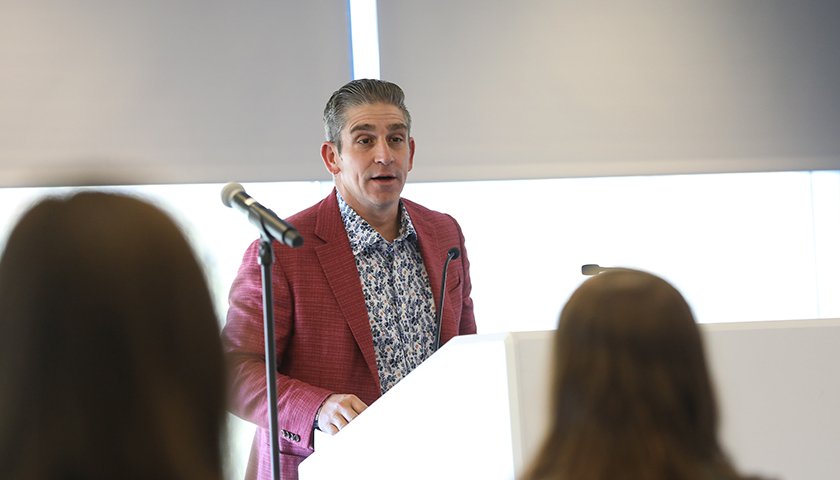Inclusive Civic Engagement

Public service professionals and academics explored the meaning and impact of inclusive civic engagement—the idea that better outcomes occur when more stakeholders are involved—at the second annual Public Service Symposium, cosponsored by the Business School’s Institute for Public Service and held on the Suffolk University campus.
With panel discussions and keynote speeches from nationally known experts, the event offered the chance to share ideas and best practices. Here are five takeaways:
#1—Civic engagement comes in many forms
The first keynote speaker was an unexpected yet powerful choice. Richard Blanco is neither an academician from a university nor a researcher from a think tank: He’s a poet. In fact, he was the poet selected by Barack Obama to read at the president’s second inauguration. To show that the arts and humanities can be an important form of civic engagement, Blanco shared several poems, including “A Poem for Barack Obama’s Presidential Inauguration” as well as works from his new book, How to Love a Country.
“I think poetry and the arts in general attach real lives, real faces, and real stories to issues that can get very abstract very quickly,” said Blanco after the event. “The humanities are a way of reenergizing what you’re doing. It’s not always stats and numbers and graphs. It’s realizing there are real people behind these stories, and the arts remind us of that.”
#2—Universities are vital to promoting civic engagement
One discussion explored the role of academia in ensuring the promotion of civic engagement, whether through get-out-the-vote efforts, encouraging students to be poll workers on election days, researching students’ voting behavior, or even, as Professor Rachael Cobb, chair of Suffolk’s Government Department, pointed out: just starting with the basics. “Part of the role of a university is to teach students the language of democracy,” she said. College of Arts & Sciences Dean Maria Toyoda moderated the panel.
#3—Whatever works, works
The conversation turned to practical matters in a panel discussion that examined best practices for engaging people in civic discourse. What are the best ways to reach people? What is true government transparency? What’s the smart way to build trust in constituencies?
“We try to change attitudes and perceptions of the police as early as possible,” said James K. Chin, assistant bureau chief of the Boston Police Bureau of Community Engagement. “A kid’s first encounter with the Boston Police should be a good one.”
Chin recounted some of the outreach the BPD does toward that end, including programs like “Shop with a Cop” and a trip to Washington, DC, that members of the force take with underserved teenagers. The goal is to show these at-risk populations that civic engagement can be a good thing.
#4—Knowledge is power…just make it accessible
The second keynote speaker was Harvard Professor Theda Skocpol, founder and director of the Scholars Strategy Network, a group that connects journalists, policymakers, and civic leaders with America’s top researchers. The non-partisan entity aims to improve policy and strengthen democracy by having subject matter experts from academia take research and “de-academicize” it, making it more accessible to non-scholars. People can then use the resulting information as they write op-eds and articles, create informed policy, and give credibility to a cause.
“The country needs its teachers and researchers to care for the citizenry as a whole,” said Skocpol. “So we find parts of academic work that speak to the community and then we get it out to a wide audience.”
#5—Civic engagement = finding your voice
The final panel discussion considered the importance of inclusivity when it comes to civic engagement. One example? Boston City Hall tries to ensure that translators are always available for people trying to navigate the city’s bureaucracy. Another is a group trying to register Boston’s voters of color—and then encouraging them to vote. A third group worked successfully to raise the state’s minimum wage. No matter what the cause, the panel concluded, inclusivity is essential.
“Including everyone leads to representation,” said Cheryl Clyburn Crawford, executive director at MassVOTE. “I think people want to see themselves, no matter who they are, in the picture. And including them in the conversation does just that.”
The Public Service Symposium was co-sponsored by the Suffolk’s Institute for Public Service, Center for Community Engagement, Faculty & Professional Learning Community on Campus Civic Culture, and Public Policy and Practice Hub.
Contact
Greg Gatlin
Office of Public Affairs
617-573-8428
Ben Hall
Office of Public Affairs
617-573-8092



